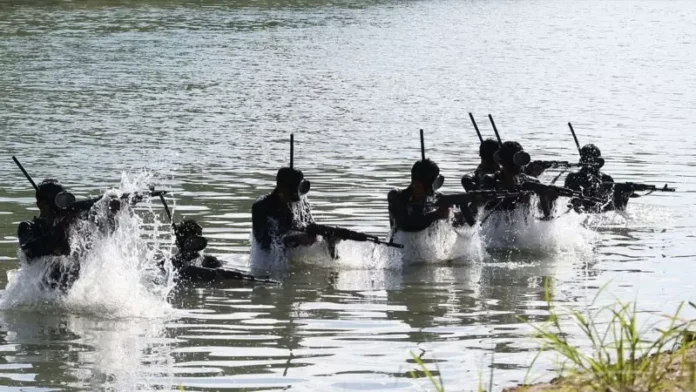New York – The United States and Russia clashed at the United Nations Security Council on Monday over reports that Moscow plans to deploy North Korean troops in its fight against Ukraine. Despite pressure from the US, Russia refused to confirm its plans, leaving many unanswered questions and concerns.
The confrontation began when US Deputy UN Ambassador Robert Wood questioned the presence of DPRK troops in Russia, referring to intelligence reports stating that 10,000 North Korean troops have been sent for training and eventual deployment in Ukraine. Wood’s question remains unanswered as Russian Deputy Ambassador Anna Evstigneeva refused to provide a direct answer, stating that the US was not in a court of law.
According to US officials, Russia has suffered significant casualties in its illegal invasion of Ukraine and is now turning to North Korea, a pariah state, for reinforcements. Ambassador Wood revealed that the North Koreans have been trained in artillery, drone operations, and basic infantry tactics, indicating that Russia intends to use them in front-line operations. This raises concerns about the level of involvement of North Korean troops in the ongoing conflict.
South Korea’s envoy also expressed concern about North Korea’s recent actions, including the destruction of rail and road links between the two nations. He described Pyongyang’s decision to dispatch troops to Russia as a desperate and dangerous move, highlighting the regime’s disregard for the well-being of its own people.
William Pomeranz, a senior scholar at the Kennan Institute, highlighted the uncertainty surrounding the experience and professionalism of the North Korean troops. He also questioned how they would react in combat situations, as they have not been in a war for a long time. This raises concerns about their ability to handle the battlefield and calls into question the motives behind Russia’s decision to enlist North Korean troops.
Western nations have also raised concerns about what North Korea stands to gain from its involvement in the conflict. There are fears that Russia may provide advanced military technology to North Korea, including for its nuclear and ballistic missile programs. This would not only bolster North Korea’s military capabilities but also shield it from further sanctions by the UN Security Council, as Russia has previously done.
Political scientist Naoko Aoki of the RAND Corporation pointed out that such support from Russia would further the regime’s goal of remaining in power and increase its influence on the Korean Peninsula. This raises questions about the long-term implications of Russia’s decision to involve North Korean troops in the conflict.
The Security Council also discussed North Korea’s recent missile launch, which Japan’s ambassador described as a grave threat. The missile reportedly reached a height of over 7,000 kilometers and had a range capability of 15,000 kilometers, covering three-quarters of the planet. This launch, along with North Korea’s continued development of its missile technology, is a flagrant violation of multiple Security Council resolutions.
North Korea’s ambassador dismissed the meeting as unlawful and interference in their domestic affairs, while Russia’s ambassador accused the US of demonizing North Korea. Meanwhile, South Korea’s ambassador condemned the launch and questioned its timing, suggesting that it may have been a distraction from North Korea’s involvement in the conflict in Ukraine.
Despite strong condemnation from the international community, North Korea remains defiant and continues to test its weapons. It is clear that their missile technology poses a significant threat to global security, and their actions must be met with strong and united condemnation.
In the midst of this tension, the US and Russia have once again found themselves at odds, with the US pressuring Russia to reveal its plans for North Korean troops. Russia’s refusal to confirm or deny its involvement only adds to the growing concerns about their actions in the region.
As the situation in Ukraine continues to escalate, it is crucial for all nations to work towards a peaceful resolution. The involvement of North Korean troops, whether confirmed or not, only adds more complexity to an already volatile situation. It is imperative that all parties involved prioritize the safety and well-being of the people in the region above their own political agendas. Only then can we hope to see an end to the conflict and a return to peace and stability in Ukraine.

